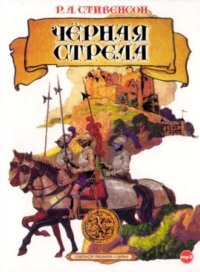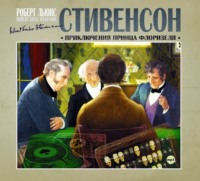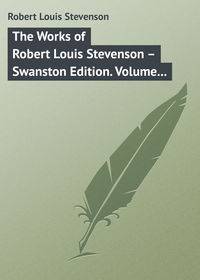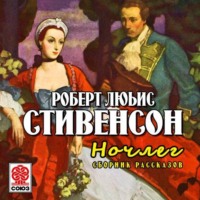Robert Louis Stevenson
A Lowden Sabbath Morn
IThe clinkum-clank o' SabbathbellsNoo to the hoastin' rookeryswells,Noo faintin' laigh in shady dells,Sounds far an' near,An' through the simmer kintrytells Its tale o' cheer.IIAn' noo, to that melodious play,A' deidly awn the quiet sway —A' ken their solemn holiday,Bestial an' human,The singin' lintie on the brae,The restin' plou'man.IIIHe, mair than a' the lave o' men,His week completit joys to ken;Half-dressed, he daunders out an'in,Perplext wi' leisure;An' his raxt limbs he'll rax againWi' painfü' pleesure.IVThe steerin' mither strang afitNoo shoos the bairnies but a bit;Noo cries them ben, their SindayshüitTo scart upon them,Or sweeties in their pouch to pit,Wi' blessin's on them.VThe lasses, clean frae tap to taes,Are busked in crunklin'underclaes;The gartened hose, the weel-filledstays,The nakit shift,A' bleached on bonny greensfordaysAn' white's the drift.VIAn' noo to face the kirkward mile:The guidman's hat o' dacent style,The blackit shoon, we noo maunfyleAs white's the miller:A waefü' peety tae, to spileThe warth o' siller.VIIOur Marg'et, aye sae keen tocrack,Douce-stappin' in the stourytrack,Her emeralt goun a' kiltit backFrae snawy coats,White-ankled, leads the kirkwardpackWi' Dauvit Groats.VIIIA thocht ahint, in runkled breeks,A' spiled wi' lyin' by for weeks,The guidman follows closs, an'cleiksThe sonsie missis;His sarious face at aince bespeaksThe day that this is.IXAnd aye an' while we nearer drawTo whaur the kirkton lies alaw,Mair neebours, comin' saft an'slawFrae here an' there,The thicker thrang the gate, an'cawThe stour in air.XBut hark! the bells frae nearerclang;To rowst the slaw, their sidesthey bang;An' see! black coats a'readythrangThe green kirkyaird;And at the yett, the chestnutsspangThat brocht the laird.XIThe solemn elders at the plateStand drinkin' deep the prideo' state:The practised hands as gashan' greatAs Lords o' Session;The later named, a wee thing blateIn their expression.XIIThe prentit stanes that mark the deid,Wi' lengthened lip, the sariousread;Syne wag a moraleesin' heid,An' then an' thereTheir hirplin' practice an' theircreedTry hard to square.XIIIIt's here our Merren lang haslain,A wee bewast the table-stane;An' yon's the grave o' SandyBlane;An' further ower,The mither's brithers, dacentmen!Lie a' the fower.XIVHere the guidman sall bideaweeTo dwall amang the deid; toseeAuld faces clear in fancy's e'e;Belike to hearAuld voices fa'in saft an' sleeOn fancy's ear.XVThus, on the day o' solemnthings,The bell that in the steepleswingsTo fauld a scaittered faim'lyringsIts walcome screed;An' just a wee thing nearerbringsThe quick an' deid.XVIBut noo the bell is ringin' in;To tak their places, folk begin;The minister himsel' willshüneBe up the gate,Filled fu' wi' clavers about sinAn' man's estate.XVIIThe tünes are up —French, tobe shüre,The faithfü' French, an' twa-three mair;The auld prezentor, hoastin' sair,Wales out theportions,An' yirks the tüne into the airWi' queercontortions.XVIIIFollows the prayer, the readin'next,An' than the fisslin' for thetext —The twa-three last to find it,vextBut kind o' proud;An' than the peppermints areraxed,An' southernwood.XIXFor noo's the time whan powsare seenNid-noddin' like a mandareen;When tenty mithers stap apreenIn sleepin' weans;An' nearly half the parochineForget their pains.XXThere's just a waukrif' twa orthree:Thrawn commentautors sweerto 'gree,Weans glowrin' at the bumlin'beeOn windie-glasses,Or lads that tak a keek a-gleeAt sonsie lasses.XXIHimsel', meanwhile, fraewhaur he cocksAn' bobs belaw the soundin'-box,The treesures of his words unlocksWi' prodigality,An' deals some unco dingin'knocksTo infidality.XXIIWi' sappy unction, hoo heburkesThe hopes o' men that trust inworks,Expounds the fau'ts o' itherkirks,An' shaws the besto' themNo muckle better than mereTurks,When a's confessedo' them.XXIIIBethankit! what a bonnycreed!What mair would onyChristian need? —The braw words rumm'le owerhis heid,Nor steer thesleeper;And in their restin' graves,the deidSleep aye thedeeper.AUTHOR'S NOTEIt may be guessed by some that I had a certain parish in my eye, and this makes it proper I should add a word of disclamation. In my time there have been two ministers in that parish. Of the first I have a special reason to speak well, even had there been any to think ill. The second I have often met in private and long (in the due phrase) "sat under" in his church, and neither here nor there have I heard an unkind or ugly word upon his lips. The preacher of the text had thus no original in that particular parish; but when I was a boy he might have been observed in many others; he was then (like the schoolmaster) abroad; and by recent advices, it would seem he has not yet entirely disappeared.
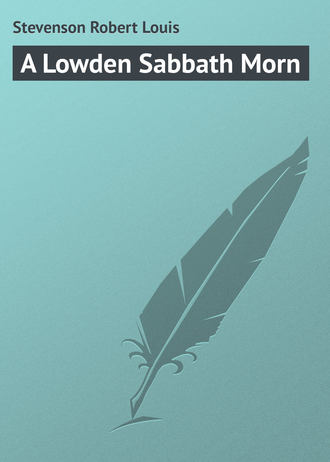 полная версия
полная версия




